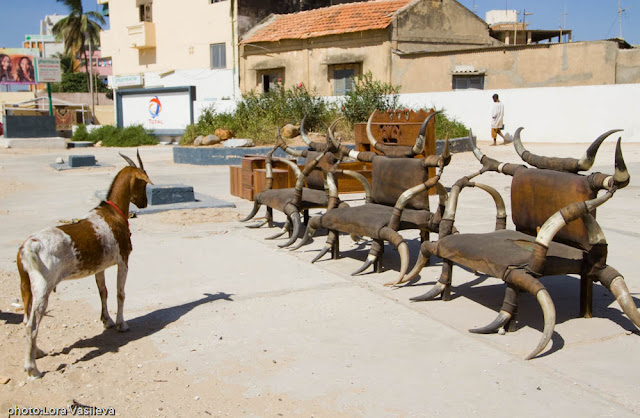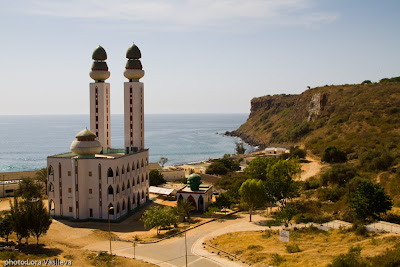On the second evening, after we couldn’t find couchsurfing, we decided not to sleep in the street again, but to stay in a hotel. After a long wait and changing 3 buses we couldn’t find the hotel we were looking for. We were just thinking to stay at the airport when we met Osman – a rastaman, who invited us to stay at his house for free. He took us to a root reggae concert and to a dance hall party on the next day. Everything was great, apart from the fact that all the time he was showing off how rich he is, how he lived in Belgium and how much money he spends, how his father was a big policeman and how important he is. His house was indeed very big and had a real shower, which for us looked like a luxury. We slept in our tent on the terrace in front of his room. He didn’t want to let us go and was making plans for he New Year’s Eve and for the future. He convinced us to leave our things at his place, because it was very safe for his father was an important policeman. We left our backpacks in his room for the night, while we were sleeping in the tent. In the morning, when we were going to go for visas to Burkina Faso we found out that all our money was missing. Osman denied everything and was swearing that he would try to help us, but he just drove us away from his house and left us without money and shelter. We found where to stay after we wrote a message for help in couchsurfing – an Indian man named Dev took us. After that we moved to other couchsurfers – Claude and Debora- Belgians- working in Dakar. Claude came with us to Osman’s house to translate for us. We spoke with the father for hours, we tried everything, but nothing helped. They didn’t want to give us our money back. Another Belgian from the couchsurfing – Johan contacted us, wanting to help. He had a shop in Dakar and experience with the police. We wrote a claim and we took it to the police department. There two policemen came with us to the house, but Osman was hiding and after some action and arguing with the father they couldn’t catch him. Two days later we went to the police to see what’s happening and to bring picture of Osman. The things were going nowhere. We lost time and money in meaningless arguing and at the end we decided to leave the big city. At least we learned a lesson and knew not to trust anybody. Especially rastamen had a bad reputation around here. Usually they are used to seducing girls, making them fall in love with them and then rob them, leaving them crying for two losses. It is so sad to think that someone is your friend and to be cheated like that. Just as we were getting ready to leave for Saloum river, we got a call from the police- Osman had shown up. We went to the police department again, without any hope. After long arguing and threats from our side that we will post this in the newspapers (we had really contacted a local newspaper), the father of Osman promised us to give the money back on 26.12.2010. We promised not to write to the newspaper and not to post pictures of Osman. It seems we will have to stay for Christmas in Dakar, but at least the waiting and all the fights were worth it. I hope the father to be a man of his word.
So we stayed for 15 days in Dakar. There isn’t much to see here - a big dirty city with lots of small beaches. Unfortunately the small, beautiful, white-sanded beaches were covered in garbage. Everybody was throwing their garbage literary everywhere and mostly in the ocean. After we had coffee with some Senegalese on the beach, they threw their plastic cups in the ocean. We couldn’t take it and asked them why they give all this plastic to the ocean. Couldn’t they see that it didn’t want it and was returning it back on the beach. They responded that the plastic was occidental - something that we brought from our civilization…
Dakar was a strange mix between Africa and Europe. It didn’t look like the normal African cities. The thing we loved in this city was the never-stopping African music and the numerous reggae concerts. We came right on time for the Third World Festival of Black Art, that was being held in Senegal this year. The opening was held on a big stadium and it was absolutely free. After some speeches of African presidents we had the pleasure to listen to music from different countries and at the end there were wonderful fireworks. The star of the evening was Youssou NDour but the biggest surprice was meeting a Bulgarian girl on the stadium. That was the first time we had the chance to talk Bulgarian with somebody.
 |
| on the market you can buy all kinds of animal parts- from horse hair to hedgehog skin |
 |
| coconuts in Dakar |
With our friend Claude and some other international couchsurfers we went to a concert of Wiclif Jean, that was also free. The concert was held in front of a statue of a man, woman and a child that was opened 8 months ago and was in a contrast with the surrounding. In front of the scene was a VIP area fenced by a wall, that was obstructing the view of the thousands of people. At the entrance of the VIP area the crowd was huge and they were letting in only those who the guards wanted. For our surprise we were VIP, because we were white and they pushed everybody aside to let us in. We felt terrible in this situation and Claude suggested that we leave the VIP as a sign of protest against this kind of racism. We went on a hill overlooking the scene, where we had a nice view without walls. Wiclif Jean was also resented and said that he will have another concert for the Senegal people. Unfortunatelly discrimination was everywhere - from our side, as well as from theirs. On the street we were called “toubab” (that’s how they call the whites here), in the shops we were asked to pay extra for everything and was very hard to find any real friends. We wanted to be brothers and to live together, but it seems that was impossible.
We managed to soak in the atmosphere of Dakar, we met with lots of foreigners living here and we even played an international Frisbee game. The time was flying in that crazy place. The transportation was slow, but fun. Lots of funky mini buses without windows and covered in drawings – mostly with writings or pictures of the spiritual leader Serigne Touba( or Ahmudo Bamba) were driving around the city. The tiny benches were always full, and if there were empty seats the bus was waiting in a spot till it gets full, sometimes for more than 10 minutes. They were stopping everywhere- you only had to knock on the tin. If the engine died the people had to push them. All the buses and the cars on the sandy streets looked as if they are going to fall apart every moment now. We couldn’t understand what force kept them moving… maybe it was Serigne Touba :)
We managed to soak in the atmosphere of Dakar, we met with lots of foreigners living here and we even played an international Frisbee game. The time was flying in that crazy place. The transportation was slow, but fun. Lots of funky mini buses without windows and covered in drawings – mostly with writings or pictures of the spiritual leader Serigne Touba( or Ahmadou Bamba) were driving around the city. The tiny benches were always full, and if there were empty seats the bus was waiting in a spot till it gets full, sometimes for more than 10 minutes. They were stopping everywhere- you only had to knock on the tin. If the engine died the people had to push them. All the buses and the cars on the sandy streets looked as if they are going to fall apart every moment now. We couldn’t understand what force kept them moving… maybe it was Serigne Touba.
Serigne Touba was a spiritual leader from the 19th century and his talibe (student) Ibra Fall was the first bay-fall, who refused to fast on Ramadan, so that he has strength to work and serve his master (Marabou). After colonization, they refused to become Christians. He and his apprentice became popular in Senegal and the Frenchmen scared by his teaching, send him in exile in Gabon. The bayfall is a strange kind of people- they are not praying and they do not fast on Ramadan, but they have lots of followers. Most of them are rastamen and many of them are begging in the streets. The bayfalls sing every Saturday and Sunday night and the people sing with them. Everybody was calling us bayfall or yayfall (for a woman). Here the Islam is very different - there are many religious groups and leaders. If a leader decides he can block a street downtown with their tent to preach their followers. Everybody is following them without questioning. In Dakar we celebrated the muslim New Year, but we barely noticed that there is a celebration. There was nothing showing it- just the usual singing of bayfalls.
At the moment we are living in a suburb of Dakar with a Senegalese family- friends of Johan. Here the men can have up to 4 wives and lots of kids. 70 % of the population is younger than 14 years and lots of kids have to work. Almost every family has a maid that cooks, cleans, does the laundry and lives in the house, usually not being paid. Like some kind of slavery.
 |
| photo studio :) |
alternative African art
 |
| the spiders here are giant |
 |
| baobab |
 |
| where are you, brothers |
Now we are going on a trip around Senegal, so we can come back on Christmas and go to the Police again.















































